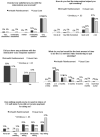Treatment Satisfaction in a Randomized Clinical Trial of mHealth Smoking Abstinence Reinforcement
- PMID: 27449226
- PMCID: PMC5154906
- DOI: 10.1016/j.jsat.2016.06.013
Treatment Satisfaction in a Randomized Clinical Trial of mHealth Smoking Abstinence Reinforcement
Abstract
The importance of patient satisfaction in modern healthcare is widely recognized, but research on satisfaction in the context of smoking cessation has not kept pace. The purpose of this study was to explore treatment satisfaction in a sample of smokers (N=84) randomized to one of two smoking cessation treatment interventions (mHealth reinforcement and mHealth monitoring) that used cell phone-based procedures to monitor smoking status in individuals' natural environments for 4 weeks. Starting on the target quit date, participants received usual care smoking cessation treatment consisting of 8 weeks of transdermal nicotine and 4 weeks of twice-weekly telephone counseling were also prompted 1 to 3 times daily (with exact number and timing not disclosed beforehand) to use a study cell phone and CO monitor to complete a CO self-test, video-record the process, and submit videos using multimedia messaging within 2 hours. mHealth reinforcement participants could earn prizes for smoking-negative on-time CO tests. A treatment satisfaction survey was completed at the end of the 4-week monitoring/reinforcement phase. Results indicate that participants overwhelmingly endorsed high levels of overall satisfaction in both conditions. Treatment adherence did not differ between conditions, but was positively associated with endorsing the highest satisfaction with help quitting with the intervention (p<.01 to .03). mHealth reinforcement was associated with increased longest duration of abstinence (p<.01). Controlling for relevant participant characteristics and treatment adherence, longest duration of abstinence robustly predicted highest satisfaction with help quitting and mediated the effect of treatment condition on that satisfaction. Further research on treatment satisfaction may aid the development of effective abstinence reinforcement and other smoking cessation interventions.
Trial registration: ClinicalTrials.gov NCT01484717.
Keywords: Behavioral treatment; Contingency management; Multi-media messaging; Nicotine replacement therapy; Text-messaging; Tobacco.
Copyright © 2016 Elsevier Inc. All rights reserved.
Figures
References
-
- Baron RM, Kenny DA. The moderator–mediator variable distinction in social psychological research: Conceptual, strategic, and statistical considerations. Journal of Personality and Social Psychology. 1986;51(6):1173. - PubMed
-
- Bock BC, Heron KE, Jennings EG, Magee JC, Morrow KM. User preferences for a text message–based smoking cessation intervention. Health Education & Behavior. 2013;40(2):152–159. - PubMed
-
- Boden MT, Moos R. Dually diagnosed patients’ responses to substance use disorder treatment. Journal of Substance Abuse Treatment. 2009;37(4):335–345. http://doi.org/10.1016/j.jsat.2009.03.012. - DOI - PMC - PubMed
-
- Carlson MJ, Gabriel RM. Patient Satisfaction, Use of Services, and One-Year Outcomes in Publicly Funded Substance Abuse Treatment. Psychiatric Services. 2001;52(9):1230–1236. http://doi.org/10.1176/appi.ps.52.9.1230. - DOI - PubMed
Publication types
MeSH terms
Associated data
Grants and funding
LinkOut - more resources
Full Text Sources
Other Literature Sources
Medical



